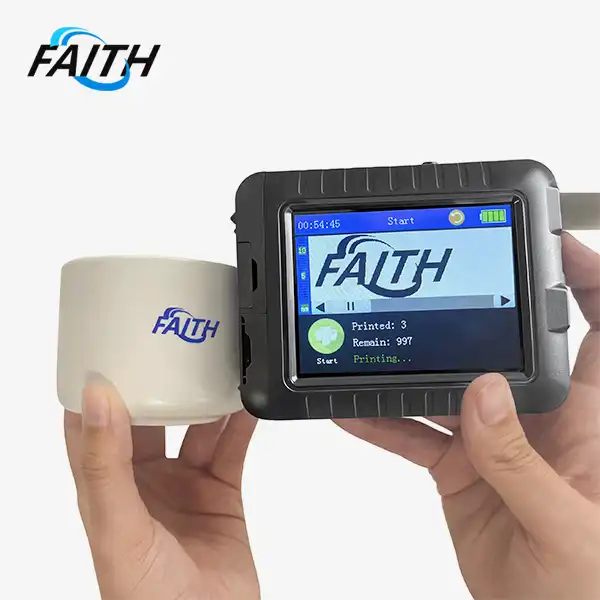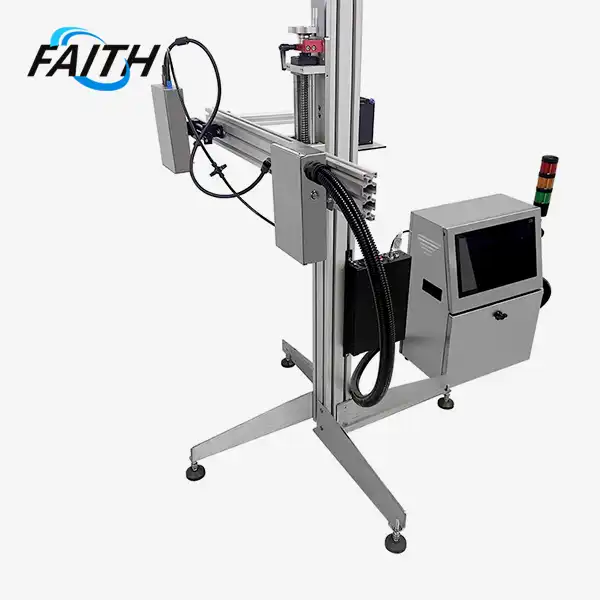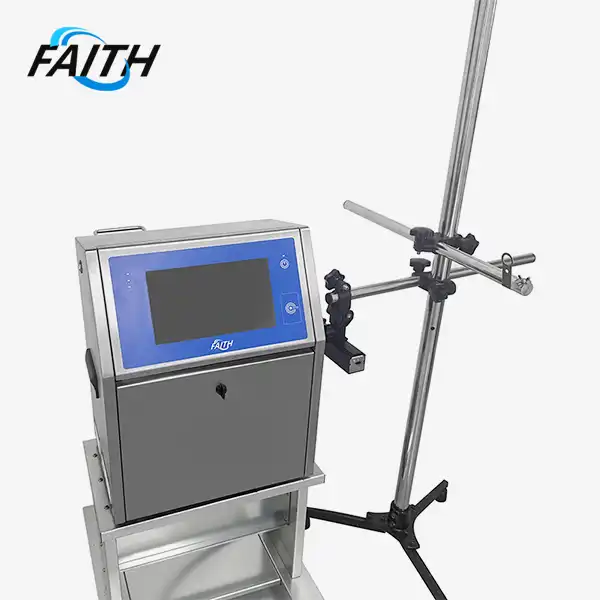Unlocking Efficiency: CIJ Printers in Modern Industries
In the fast-paced world of modern manufacturing, Continuous Inkjet (CIJ) printers have emerged as a game-changing technology, revolutionizing product coding and marking processes across various industries. These high-speed, versatile printing systems are pivotal in enhancing production efficiency, ensuring product traceability, and meeting stringent regulatory requirements. By leveraging the power of CIJ continuous inkjet printers, businesses can streamline their operations, reduce errors, and ultimately boost their bottom line. This article delves into the transformative impact of CIJ printers and how they are unlocking new levels of efficiency in modern industrial settings.
The Evolution of CIJ Technology: Powering Industrial Printing
Continuous Inkjet (CIJ) printing technology has come a long way since its inception. Originally developed in the 1960s, CIJ printers have undergone significant advancements, becoming increasingly sophisticated and reliable. Today's CIJ continuous inkjet printers are marvels of engineering, capable of printing at lightning-fast speeds while maintaining exceptional print quality.
The Core Principles of CIJ Printing
At the heart of CIJ technology lies a simple yet ingenious concept. The printer generates a continuous stream of ink droplets, which are then selectively charged and deflected to create the desired pattern on the substrate. This process occurs at an astounding rate, with thousands of droplets being produced every second.
The key components of a CIJ continuous inkjet printer include:
- Ink reservoir and pump system
- Printhead with a nozzle for ink ejection
- Charging electrode
- Deflection plates
- Gutter for collecting unused ink
This setup allows for non-contact printing, making CIJ printers ideal for marking a wide range of materials and surfaces, including curved or uneven surfaces.
Advancements in CIJ Printer Technology
Modern CIJ printers have seen remarkable improvements in several areas:
- Print Quality: Enhanced nozzle designs and improved ink formulations have led to sharper, more legible prints.
- Speed: Today's CIJ continuous inkjet printers can operate at speeds of up to 1000 feet per minute, making them suitable for high-speed production lines.
- Versatility: Advanced CIJ printers can handle a diverse range of inks, including pigmented, UV-curable, and specialty inks for specific applications.
- User Interface: Intuitive touchscreen interfaces and remote management capabilities have simplified printer operation and maintenance.
- Environmental Impact: Eco-friendly ink formulations and improved ink recycling systems have made CIJ printers more sustainable.
These advancements have positioned CIJ continuous inkjet printers as indispensable tools in modern industrial settings, capable of meeting the diverse and demanding needs of various sectors.
Applications Across Industries: CIJ Printers in Action
The versatility and reliability of CIJ continuous inkjet printers have made them indispensable across a wide spectrum of industries. Let's explore how different sectors are leveraging this technology to enhance their operations and meet regulatory requirements.
Food and Beverage Industry
In the food and beverage sector, CIJ printers play a crucial role in ensuring product traceability and compliance with labeling regulations. These printers are used to mark packaging with:
- Expiration dates
- Batch codes
- Production dates
- Lot numbers
- Nutritional information
The ability of CIJ continuous inkjet printers to print on various surfaces, including plastic, glass, and metal, makes them ideal for the diverse packaging types used in this industry. Moreover, their high-speed capabilities ensure they can keep up with fast-moving production lines without compromising print quality.
Pharmaceutical and Healthcare
In the pharmaceutical industry, where accuracy and traceability are paramount, CIJ printers are instrumental in:
- Printing unique identifiers on medication packaging
- Applying lot numbers and expiration dates
- Marking medical devices with serial numbers
- Ensuring compliance with regulatory standards like the FDA's Unique Device Identification (UDI) system
The precision and reliability of CIJ continuous inkjet printers help pharmaceutical companies maintain stringent quality control measures and combat counterfeit products.
Automotive and Industrial Manufacturing
In the automotive and industrial sectors, CIJ printers are used for a variety of applications:
- Marking parts with serial numbers and production codes
- Applying date codes to rubber and plastic components
- Printing logos and branding on finished products
- Marking cables and wires with identification codes
The durability of CIJ prints, even in harsh manufacturing environments, ensures that critical information remains legible throughout a product's lifecycle.
Electronics and Consumer Goods
In the electronics industry, faith printers are valued for their ability to print small, precise codes on components and PCBs. They are used for:
- Applying serial numbers to electronic devices
- Marking components with tracking codes
- Printing barcodes and QR codes for inventory management
- Adding manufacturing dates to consumer electronics packaging
The non-contact nature of CIJ printing makes it suitable for delicate electronic components, reducing the risk of damage during the marking process.
Maximizing Efficiency: Integrating CIJ Printers in Industry 4.0
As industries move towards greater automation and digitalization, CIJ continuous inkjet printers are evolving to meet the demands of Industry 4.0. This integration is unlocking new levels of efficiency and productivity in manufacturing processes.
Smart Factory Integration
Modern CIJ printers are equipped with advanced connectivity features that allow them to seamlessly integrate into smart factory ecosystems. This integration enables:
- Real-time monitoring of printer performance
- Automated ink level management and maintenance alerts
- Integration with Manufacturing Execution Systems (MES) for streamlined production planning
- Data collection for analytics and process optimization
By connecting CIJ printers to broader factory networks, manufacturers can achieve greater visibility into their operations and make data-driven decisions to improve efficiency.
Enhanced Traceability and Quality Control
The integration of CIJ continuous inkjet printers with other systems in the production line enhances traceability and quality control measures:
- Automated verification systems can check print quality in real-time
- Integration with vision systems for accurate code placement
- Synchronization with weighing and inspection equipment for comprehensive quality assurance
- Centralized data management for improved recall capabilities and regulatory compliance
These integrated systems not only improve product quality but also provide a robust framework for managing recalls and addressing potential issues quickly and effectively.
Flexible Production and Customization
The adaptability of CIJ printers makes them ideal for flexible manufacturing environments:
- Quick changeovers between different product runs
- On-demand printing for custom or personalized products
- Integration with ERP systems for just-in-time production
- Support for variable data printing, enabling unique codes for each item
This flexibility allows manufacturers to respond quickly to market demands and implement mass customization strategies without sacrificing efficiency.
Sustainability and Cost Reduction
The integration of CIJ continuous inkjet printers into Industry 4.0 frameworks also contributes to sustainability efforts and cost reduction:
- Optimized ink usage through precise control and monitoring
- Reduced waste through improved print accuracy and fewer errors
- Energy efficiency through smart power management features
- Longer equipment lifespan through predictive maintenance
By maximizing the efficiency of CIJ printers, manufacturers can reduce their environmental footprint while also lowering operational costs.
Conclusion
CIJ continuous inkjet printers have become indispensable tools in modern industries, offering unparalleled speed, versatility, and reliability in product coding and marking. As we've explored, these printers are not just standalone devices but integral components of the smart factories driving Industry 4.0. By embracing CIJ technology and integrating it into broader manufacturing ecosystems, businesses can unlock new levels of efficiency, traceability, and quality control.
The future of industrial printing looks bright, with ongoing advancements in CIJ technology promising even greater capabilities and efficiencies. For businesses looking to stay competitive in rapidly evolving markets, investing in state-of-the-art CIJ printing solutions is not just an option—it's a necessity.
To learn more about how CIJ continuous inkjet printers can transform your industrial operations or to explore wholesale continuous inkjet technology for your specific needs, don't hesitate to reach out to our team of experts at Shenyang Faith Technology Co., Ltd. Contact us at sale01@sy-faith.com for personalized advice and cutting-edge industrial printing solutions.

FAQ
What materials can CIJ printers mark on?
CIJ printers can mark on a wide range of materials, including plastic, glass, metal, paper, and even some textiles. Their versatility makes them suitable for various industries.
How fast can CIJ printers operate?
Modern CIJ printers can operate at speeds of up to 1000 feet per minute, making them ideal for high-speed production lines.
Are CIJ printers environmentally friendly?
Many modern CIJ printers are designed with eco-friendly features, including low solvent consumption and recyclable ink systems, making them more environmentally friendly than older models.
References
1. Johnson, M. (2022). "Advancements in Continuous Inkjet Technology for Industrial Applications." Journal of Printing Science and Technology, 45(3), 178-195.
2. Smith, A. R., & Brown, T. L. (2021). "Integration of CIJ Printers in Smart Manufacturing Environments." International Journal of Industrial Engineering, 33(2), 89-104.
3. Lee, S. H., et al. (2023). "Sustainability Impacts of Modern Coding and Marking Technologies in Food Packaging." Sustainable Production and Consumption, 18, 245-260.
4. Garcia, R. M. (2020). "Continuous Inkjet Printing: Principles, Applications, and Future Prospects." Advanced Materials and Processes, 178(5), 22-29.
5. Patel, N., & Wilson, K. (2022). "The Role of CIJ Printers in Pharmaceutical Traceability Systems." Journal of Drug Safety and Compliance, 14(4), 301-315.
Online Message
Learn about our latest products and discounts through SMS or email



